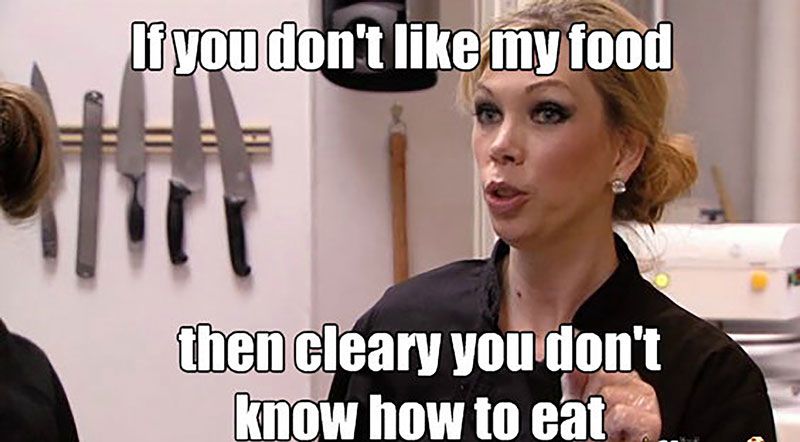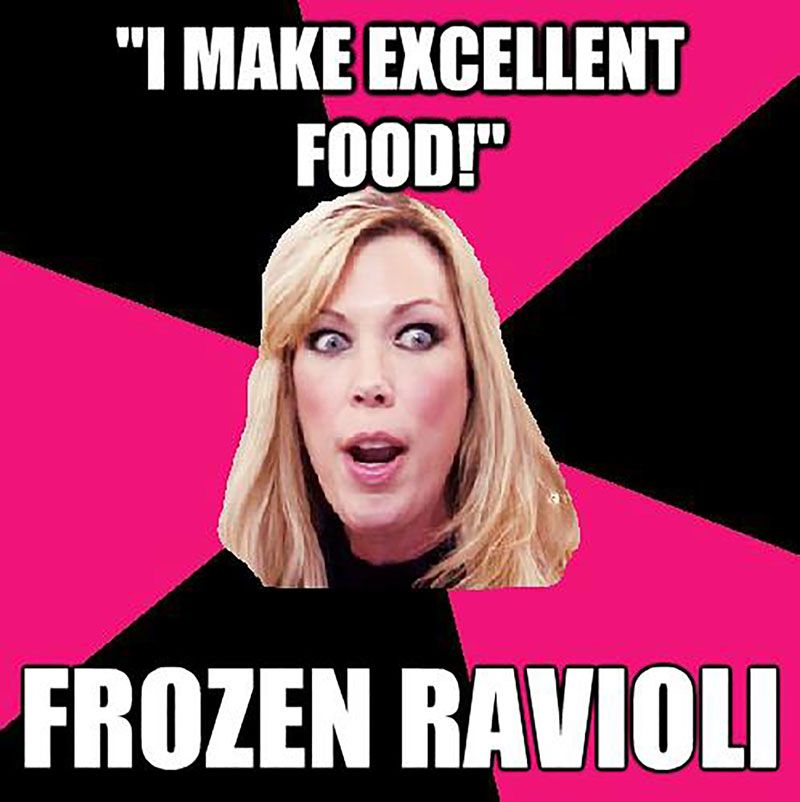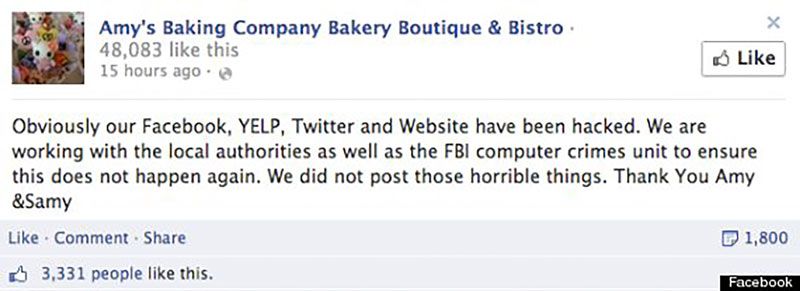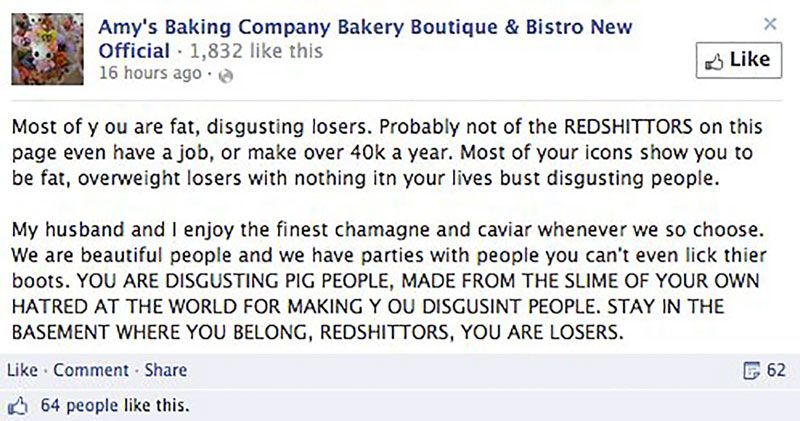Nathena Haddrill, author
Dr. Alec Hosterman, Faculty Advisor
Abstract:
This case study focuses on how media relations can go awry very simply. Focusing specifically on Amy’s Baking Company and how they handled their customer relations, how the situation escalated after an episode on Kitchen Nightmares, and how the public handled it.
Media relations is important to every company. It is how companies communicate to customers, as well as creating promotional marketing for businesses. According to the study, Customer Relations in Social Media: Social Media Usage Motives, Expected Responses from Organizations, and Electronic Word of Mouth, “More and more organizations are attempting to use social media as a public relations tool to establish and maintain good customer relations” (Ming-Yi, 2015). Most businesses try to keep things positive and level headed when it comes to criticism. However, sometimes, without any media relations background, actions on social media can go in the wrong direction.
Background Information
On May 10th, 2013 Kitchen Nightmares released its sixteenth episode of the sixth season. In this episode, chef and show host, Gordon Ramsay, visits Amy’s Baking Company. Restaurant owners, Amy and Samy Bouzaglo, were asking for help to fix the issues they were encountering in and outside the restaurant. They believe they were being hounded on social media by bloggers and reviewers, and they believed they were being falsely accused of having terrible food and that it was detrimental to their business. They wanted Chef Ramsay to come and clear their name with his status as a top chef. At the start of the show, when he entered the restaurant, Chef Ramsay did not see any organizational or health hazard issues. It was clean, labeled and in tip-top shape for a restaurant. However, as the day went by, it became clear that customer service was the main problem that the restaurant faced.
In the beginning of the episode, there is a timeslot that previews the restaurant before Ramsay’s arrival. You hear cursing and yelling. Then, you see one of the owners pushing customers around and throwing them out. There is very little staff and one chef, Amy, who is the only person handling and cooking the food. Therefore, the kitchen prepares one table’s dishes one ticket at a time. The waitresses can only take orders, but cannot put orders in the system, pour wine, handle money, or take tips. The co-owner, Samy, receives and keeps the tips, because the staff gets paid hourly and “does not deserve” them (Hunter, 2013).
After meeting the owners, Ramsay has the traditional menu tasting, as he does on every episode. According to his opinion, the food is terrible. From soggy dough to meat cooked improperly, nothing was up to standards for Chef Ramsay: there was store bought ravioli, when it is promoted as fresh, a salmon burger that tastes like cat food, and a burger with ingredients that did not even mix together. Ramsay gives his criticism to Samy, and he is supposed to relay it back to Amy; however, he does not, because Samy states that she does not take criticism. Throughout the day as Ramsay observes the kitchen, he asks Amy and Samy as to why she is not receiving the criticism and why she cannot handle it or work on it to fix her food. She continually argues with him that it “makes no sense, her food is the best, and people usually love it.” Ramsay decides that there is a level of delusion and dysfunction within this restaurant as he observes them throughout the rest of the night.
In the second day of his observation, Ramsay comes up with a restaurant restoration plan to bring light to the restaurant. Within a few minutes of sitting down with the owners, there is arguing and yelling from the owners towards Ramsay. They will not listen to what he has to say and he tries to explain that they need to listen in order to change and work to be a better restaurant. Amy becomes hysterical and reveals that she does not believe there are any problems with the way they handle their restaurant. She claims her food is good and that the people on the Internet are the real problem. She accuses them of giving fake reports and bullying. She also informs him that she replies back, calling them names such as moron, loser, etc. These are some of the less explicit comments to be revealed. She thinks this is standing up to online bullies, because other businesses will not do it. The whole conversation gets out of hand and Ramsay begins to understand that this duo does not want his help. At the end of the conversation he states, “You’re too far gone… The right thing for me to do is to get out of here. Good Luck,” and leaves.
After the show aired, Amy’s Baking Company and reviewers took over social media. Buzzfeed’s Ryan Broderick wrote an article called, This is the Most Epic Brand Meltdown on Facebook Ever in reference to what became the aftermath of the episode (2013). Overnight, the episode became the number one trending story in America on the Internet. The story went viral and people created cartoons, gifs, and memes from comments made during the show.
 (Figure 1 Source: memecenter.com)
(Figure 1 Source: memecenter.com)
(Figure 2 Source: anythingbakingmemes.tumblr.com)
Their Facebook page, alone, received thousands of comments calling them crazy, stupid, and that their food was so bad that it made Ramsay leave. Amy and Samy did not let it go. They retorted and replied back making nasty comments to viewers, such as “You are all little punks. Nothing. You are all nothing. We are laughing at you. All of you, just fools,” and more explicitly, “You people are all shit. Yelp shit, Reddit Shit. Every shit. Come to here, I will f*cking show you all.”
After a few days of rebuttals and arguments with bloggers, reviews and Facebook posts, the rhetoric came to a halt. The co-owners of the restaurant made a post stating that they were hacked and that they did not say any of those things. However, that did not last long before more comments and reviews by online users caused the owners to lash out with their opinions online, once again. Throughout the entirety of the controversy, they did have more people coming to the restaurant, but it wasn’t all for the service according to online reviewers and bloggers. One comment on Broderick’s Buzzfeed article states, “Crazy, this restaurant is not far from me. Now I want to go there just to see the circus,” (2013).
In September 2015, Amy’s Baking Company closed for good. The way the owners treated their staff and customers in person was considered atrocious according to online bloggers and reviews. The way they handled it on social media became a nationwide disaster. Researcher Ming-Yi found that “The more engaged a customer is with a brand, the more likely he or she will write positive comments on social media sites about the company, brand, product, or service” (2015). Yi also found that “the results suggest that many consumers expect companies to change policies if they have negative experiences with the company and make negative comments.” Originally, the reviews were made by restaurant goers who wanted to see a change in the business. Amy and Samy didn’t see it this way and saw it as forms of attack by customers. They did not take criticism lightly, and by the way they retorted against Ramsay, they didn’t seem to want anyone else’s help, either. The restaurant owner’s reactions through social media became unnecessary and had a negative impact on their business as a whole. In comparison to companies with more positive feedback through social media relations, Amy’s Baking Company was on the opposite end of the spectrum.
Current Situation
After the episode of Kitchen Nightmares airs on television, Amy’s Baking Company’s actions go viral. Viewers from all over the country are talking about it on social media, creating memes, cartoons, gifs, and vine videos slandering and making fun of the restaurant owners. Amy’s Baking Company decides to retaliate through their Facebook page with insulting posts to those talking about them and making negative or poor restaurant reviews.
 (Figure 3 Rachel Tepper’s Huffington Post article, Amy’s Baking Company Freaks out Online after Epic Meltdown on Gordon Ramsay’s ‘Kitchen Nightmares’)
(Figure 3 Rachel Tepper’s Huffington Post article, Amy’s Baking Company Freaks out Online after Epic Meltdown on Gordon Ramsay’s ‘Kitchen Nightmares’)
(Figure 4 Rachel Tepper’s Huffington Post article, Amy’s Baking Company Freaks out Online after Epic Meltdown on Gordon Ramsay’s ‘Kitchen Nightmares’)
After many insulting posts, the restaurant’s Facebook page released a post stating that they had been hacked and contacted local authorities. There is no way for the public to know if this is true or if they were just trying to cover up their mistakes. They shut this page down and notified their followers that they had created a new page for a fresh start. Shortly after more negative posts were made from reviewers, the Amy’s Baking Company began retaliating again.
(Figure 5 Rachel Tepper’s Huffington Post article, Amy’s Baking Company Freaks out Online after Epic Meltdown on Gordon Ramsay’s ‘Kitchen Nightmares’)
(Figure 6 Rachel Tepper’s Huffington Post article, Amy’s Baking Company Freaks out Online after Epic Meltdown on Gordon Ramsay’s ‘Kitchen Nightmares’)
Eventually, this page too, was deleted after hiring a public relations firm to handle online relations for them.
Amy’s Baking Company continued on in their ways from 2013-2015. People from all over the country, according to online reviews, would come and visit just to see if the owners were as crazy as everyone made them out to be. Multiple Yelp reviewers commented that you shouldn’t use your phone while at the restaurant, because they are paranoid about bad reviewers out to get them. They also continually brought up the show to their customers, called it all lies and talked negatively about Chef Gordon Ramsay.
In October 2014, Samy accused Ramsay of sexually assaulting his wife, Amy, in the kitchen during the filming of the show. In an interview with KTAR News with Sandra Haros, Samy states,
“The only thing that pissed me off is when he sexually harassed my wife in the kitchen. This is why I went crazy on him. It’s the only reason. Not because he criticized my wife’s food; it’s a show. I asked him here to have his show. But when he tried to sexually harass my wife and accused me of stealing the tip, it’s finished” (Haros, 2014).
Outside of accusations and threats to sue, the couple let it go and moved on from these statements. They refused to go into detail, and nothing more came from what they were trying to accomplish.
In September 2015, Amy’s Baking Company closed their retail storefront. After the show, the restaurant made some changes. It began by firing most of its staff and within days, rehired most of the staff back. It also changed the menu to salads, sandwiches and souplong with Amy’s desserts. Samy continued to take tips from customers and was the only one to handle the register, as well as putting in the orders. They created T-shirts with famous statements from the show in order to gain money from their online notoriety. Some of the sayings included a statement from Samy, “I’m the Gangster,” and when Amy threw a customer out, “Here’s your pizza, go F**k yourself.” The staff would wear them in the restaurant, as well as sell them to paying customers. Even after these changes, the business began to die down. Due to bad reviews, low attendance, and the appearance of bad customer relations, this eventually led to the closing of the restaurant.
Reddit holds “Ask Me Anything” (AMA) question platforms every week and with major guests on special occasions. In April 2015, along with some help, Gordon Ramsay held his first AMA, as well as a live Twitter feed of the event. A user with the tagname ‘Burnthebridgex’ asked Ramsay, “Have you had any contact with Amy’s Baking Company since their Kitchen Nightmares episode? How do you feel about the fact that they basically became a meme?” (Reddit, 2015). Ramsay, replied in complete detail,
“Are you mad? No! I haven’t. I just… I dunno. […] I think it’s absurd and I’m now on the verge of actually feeling sorry for them, because it’s not correct. They’re one of a kind. I have no desire to come back. It was the only time I ever threw the towel in – where I physically can’t do any more. […] I’m frustrated with them. And I just wish they’d listen. You know, them becoming sort of big online – I’ve seen some of the stuff they’ve been doing and saying, and it’s quite embarrassing. […] I just wish they’d put their heads down, and let their business, you know, think for itself, rather than trying to react to every little sort of negativity” (Reddit, 2015).Bottom of Form
Ramsay makes it clear that, in his opinion, the owners were not handling the situation correctly and that he just wanted to help. However, according to Ramsay, at the rate they were going and how stubborn they were in their ways, they had given him the message that they did not want his help.
According to Daniela Galarza with Eater, Amy and Samy sold the restaurant because of issues with the landlord, not because of the show; however, they will be keeping the name Amy’s Baking Company for her online instructional cooking videos. She will also “be making desserts for a Phoenix-area restaurant group” (Galarza, 2015).
Questions
The questions below are to be used in small group discussions for developing a social media strategy. The purpose of the following questions is to consider the consumer relations, the media and public’s reactions, and the online interactions made by key stakeholders and what could be done to improve the situation regarding this case study.
- What were some of the promotional / public relations activities for Amy’s Baking Company? How were they problematic?
- What are some of the key stakeholders in this situation?
- What are some of the social media strategies that Amy’s Baking Company used? What are some tactics that should have been used?
- Do you think Chef Ramsay should have tried helping the restaurant out more? Why or why not?
- How could Chef Ramsay have helped the restaurant more?
- Do you think that Kitchen Nightmares exaggerated the situation? Why or why not?
- What specific public relations strategies can Amy’s Baking Company do to improve their consumer relations?
- What kind of social media plan would you recommend for Amy’s Baking Company?
- Do you think that the fame is positive for their restaurant? What are some of the costs and benefits to this fame?
- How are Amy and Samy’s interactions with key audiences positive? How are they negative?
- Do you think the media’s response was ethical towards Amy’s Baking Company? Why or why not?
- Do you think Amy’s Baking Company’s response was ethical towards their online reviewers? Why or why not?
- How could Amy’s Baking Company have built a better relationship with their clientele?
References
Broderick, R. (2013). This Is The Most Epic Brand Meltdown On Facebook Ever. Retrieved from http://www.buzzfeed.com/ryanhatesthis/this-is-the-most-epic-brand-meltdown-on-facebook-ever#.lqMl53nlJe
Galarza, D. (2015). Kitchen Nightmares’ Most Notorious Restaurant, Amy’s Baking Company, to Close. Retrieved from http://www.eater.com/2015/7/10/8928887/kitchen-nightmares-amys-baking-company-shutter
Glenn, T. (Director). (2014). Kitchen Nightmares: Amy’s Baking Company [Motion picture]. United States: FOX. Season 7, Ep. 1
Haros, S. (2014). Amy’s Baking Company claims sexual harassment by Gordon Ramsay – KTAR.com. Retrieved from http://ktar.com/story/92629/amys-baking-company-claims-sexual-harassment-by-gordon-ramsay/
Hunter, J. (Director). (2013). Kitchen Nightmares: Amy’s Baking Company [Motion picture]. United States: FOX. Season 6, Ep. 16
Ming-Yi, W. (2015). Customer relations in social media: Social media usage motives, expected responses from organizations, and electronic word of mouth (eWOM). China Media Research, 11(3), 65-72.
Reddit, Inc. (2015). I am Gordon Ramsay. AMA. Retrieved from https://www.reddit.com/
Tepper, R. (2013). Amy’s Baking Company Freaks Out Online After Epic Meltdown On Gordon Ramsay’s ‘Kitchen Nightmares’ [UPDATED]. Retrieved from http://www.huffingtonpost




